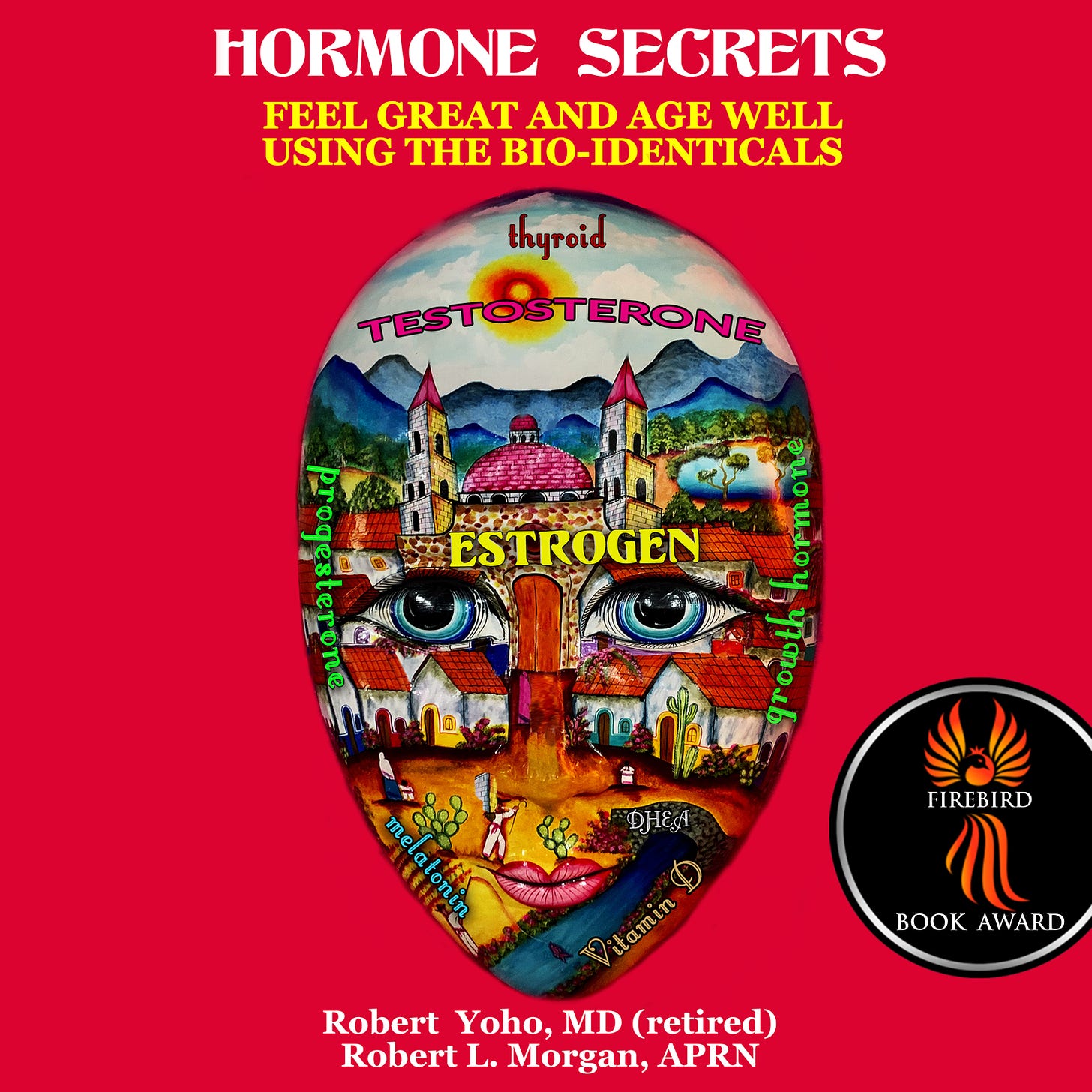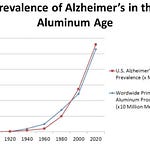This is a free chapter from Hormone Secrets, which is available on Amazon and wherever books are sold. The award-winning author (moi) has over 150 five-star reviews.
Do hormones improve sex? Yes. Testosterone has obvious effects for nearly everyone, and progesterone helps women. Estrogen improves sexuality for both men and women. Some hormone doctors give older men one or two mg a day to raise their levels to the normal youthful numbers of about 50-80 pg/ml. This does not feminize them. When thyroid is dosed to produce blood levels at the top of the “normal” lab range, many men and women report more interest. (I have experienced this.) And HGH produces sexual improvement for many users.
Oxytocin is another hormone that is well-known as a female lactation or breast milk stimulant. It is found in both men and women and has effects on sexual arousal, bonding with children, and romantic attachment to partners. Researchers think it reduces fear, facilitates trust, and might treat depression.
Oxytocin is sometimes used to treat delayed ejaculation in men. My friend Steven, 78, told me he had trouble until he tried it. (It did not work for me.) He said, “Bob, I feel like a teenager now. I need to do math in my head to avoid finishing too early. It’s great!”
For women, oxytocin works something like Viagra for men. It is available in an expensive, proprietary nasal spray. The drug is bio-identical, so it cannot be patented, and compounders make an economical 20 mg pill.
To complete this story, Viagra and Cialis (which are not hormones) improve male erections and are relatively nontoxic. Viagra lasts about 8 hours, while Cialis may last up to 36 hours. Potential issues include flushing, headaches, stomach upset, flu-like symptoms, and several other less likely issues. Viagra comes in 50 and 100 mg pills, but compounders sometimes use 10 mg combined with 10 to 20 mg of Cialis. When used together, the two drugs may have a bigger effect than either taken alone, and the low doses cause few side effects.
Compounders invented another stimulant for women that they market as “scream cream.” One preparation contains Viagra 3% and nitroglycerin 0.2% in an ointment. This is applied to the clitoris 30 minutes before sex. Others add aminophylline, an asthma drug that dilates blood vessels. I have heard from reliable sources that these concoctions work.
Can natural hormones be used to treat hair loss? What works best for hair loss is unclear, but hormone blockers are not the only way to treat it. Balancing and optimizing testosterone may be the best method to thicken women’s hair and prevent thinning. Deficiency can cause hair loss, but using high doses might as well. Some believe that taking testosterone causes balding in both men and women. Also note: For men, supplementing with cream testosterone may cause more hair loss than injections because it raises DHT more. Switching to injectable may grow hair back.
Low thyroid conditions are well known to cause hair loss. Optimizing the thyroid helps hair quality and thickness for both men and women.
Hair transplantation is a minor surgical procedure that works. Hair roots are removed from the “permanent” hair areas in the back of the head and placed into the front. By now (2021), I would be bald on top without my 2500 grafts. Men with a well-defined hair loss pattern have the best results. Most women have diffuse thinning, so their outcomes are not as good, so hormone solutions should be considered first. For those on a budget, Turkey has many economical hair transplantation clinics with great reputations.
For excess hair: Women may be successfully treated with metformin, spironolactone, birth control pills, and/or oral estrogen. Spironolactone somehow produces more healthy hair growth for them. It can both improve scalp hair thickness and decrease excess hair. It is a mild diuretic, anti-inflammatory, and testosterone blocker.
Can hormones be used to treat cancer? Yes. Testosterone suppresses breast cancer. Oral estradiol is safe and efficacious for treating prostate cancer. Patients using these hormones do not get damaging deficiency syndromes. Whether they work better than the industry’s conventional therapies is unknown. Costly studies will never be done because human hormones can rarely be patented—they are unprofitable compared to patent drugs.
Estrogen blockers are conventional therapies for estrogen-sensitive breast tumors. But these cause menopause symptoms and, over time, ruin health. Since testosterone is broken down into estrogen, traditional doctors think that using it for these cases is improper, especially if the patients are taking blockers.
Rebecca Glaser, MD, published her successful experience treating breast cancer using implantable pellets combining testosterone and a blocker drug. She placed these under the skin close to the cancers. Charles Mok, DO, shrank a woman’s breast cancer 75 percent in six months using testosterone pellets (personal communication. He wrote Testosterone, Strong Enough for a Man, Made for a Woman, 2018). Testosterone shrinks breast cancer in animals as well.
I have heard from Dr. Glaser’s patients that she treats breast cancer patients with about three times the customary menopause testosterone pellet dosage—about three mg per pound. This likely produces blood levels over 600 ng/dl. For reference, postmenopausal women receive a pellet dose of one mg per pound, which produces blood levels of 200 to 300 ng/dl. This makes most women feel great (recall my superwomen). The usual pellet dose for a man is 10 mg per pound. This may produce blood levels of 1500 ng/dl. Weekly injections of inexpensive testosterone cypionate provide similar effects as pellets.
Side effects: Recall that high doses of testosterone for women potentially cause deep voices, enlarged clitorises, and active, possibly overactive sexuality. The women I know who use these doses for athletics do not mind, but they dislike hair growth and acne. These may be treated with laser hair removal and acne medications including spironolactone.
Synthetic progestins such as Provera cause some breast cancer, but bio-identical progesterone is at worst neutral. No published literature recommends against using it for breast cancer patients. One idea favoring it is that young women with high blood levels do not get cancer.
You can find physicians online who treat breast cancer with testosterone. Consult them over the phone if they are distant. Study Glaser’s hormonebalance.org for more—she is a leader.
Should hormone therapy be used for breast cancer survivors? Yes—over 50 published studies confirm this. The mainstream recommendation is to wait five years after diagnosis before starting treatment, but some sources say to only wait one year if there is no tumor extension beyond the capsule of the armpit lymph nodes. Some studies have shown double the breast cancer recurrence rate in women who are left untreated.
I’m taking Prozac, Xanax, and Zyprexa for depression. Should I consider hormones instead? Yes. Estrogen, progesterone, testosterone, DHEA, vitamin D, and human growth hormone have antidepressant effects. Recall that thyroid (T3) has been used to treat depression since the 1930s and works the best.
The drug companies and the mental health industry now claim that a double-digit percentage of Americans is depressed. But the drugs they recommend are addictive and toxic. In your case, Zyprexa is an “atypical antipsychotic” medication that was originally developed for insanity but is now commonly used for depression. Like the other drugs in its class, it decreases the average lifespan by ten to twenty years.
Prozac is an addictive antidepressant that occasionally causes violence and suicide. This was known by the manufacturer at the time of its approval. Xanax is an anti-anxiety medication that is at least as addictive as the others. According to its original FDA approval studies, it does more harm than good after only a few weeks of use. This finding was ignored when the drug was approved.
Grab-bags of medications like these are given to almost anyone who goes to see a psychiatrist. Withdrawal from each of these drugs is often agonizing and may require tapering doses over many months. The symptoms of the original problem, such as depression and anxiety, return during the withdrawal process.
For support of these statements, see the Living on Planet Psych chapters of Butchered by “Healthcare.”
My doctor says I have polycystic ovarian syndrome (PCOS), and I can’t get pregnant. What can I do? This affects ten percent of premenopausal, reproductive-age women. No one is sure what causes it. People with PCOS often have:
✪ Irregular or prolonged menstrual periods
✪ Acne, baldness, extra hair, and high testosterone levels
✪ Ovaries with cysts that do not make eggs
✪ Obesity or at least weight gain (weight loss helps)
✪ Heart disease, cancer, and the metabolic syndrome
Treatment is effective and makes most women feel great. We supplement T3, DHEA, and progesterone until the blood levels are high-normal. Progesterone levels should be raised to at least 10 to 20 ng/dl, which may require 200 to 600 mg a day or more. We usually divide the dose and give it twice a day for these patients. Appropriate candidates achieve fertility nearly every time. This is harmless, but few in the medical mainstream know about it.
Are my hormones making me gain weight? Thyroid, estrogen, HGH, testosterone, and DHEA promote weight loss and improve cholesterol. Their use reduces the bad visceral fat surrounding abdominal organs. A potbelly is terrible for your health because the fat in this location activates diabetes and coronary artery disease.
Over longer periods, testosterone works better than any diet drug. When 656 men from Boston and Germany took testosterone, they lost weight gradually for a full decade. Some physicians advertise these effects. Search for “testosterone and weight loss” to see dramatic images.
Women gain about ten pounds after menopause if they do not take hormones and five pounds if they do. Some are fluid retention, and diuretics treat this effectively.
I take estrogen but still have pain during sex. What can I do? Oral estradiol may not entirely protect the vagina, but a compounded troche inserted into the vagina will help. The best ones combine estradiol one mg with DHEA 20 mg in the dissolvable suppository. This improves sexual interest along with treating menopausal symptoms. Weaker doses, such as estradiol .1 mg combined with DHEA 10 mg, usually cure pain with sex, but the effects are limited to the vagina.
The little waxy tablet dissolves immediately. One woman told me, “I didn’t want to use that thing, but it turned out to be easy, and it made me feel sooo good.” Estring and the Femring are the patented delivery systems. Recall, they are plastic estrogen slow-release devices that are left in the vagina for months.
Can I use hormones to treat my fibromyalgia and chronic fatigue syndrome (CFS)? People with this may be miserable and unproductive for years. Symptoms can include headache, sore throat, joint pain, and tender muscle points. Some have poor memory, prominent lymph nodes, and an inability to concentrate. Many feel terrible after exercise and remain fatigued after sleeping. Some sources claim these syndromes affect two percent of US citizens.
CFS baffles physicians. Some believe these patients are psychiatric cases. Doctors usually give them given trials of antidepressants. Occasionally, doctors find Lyme disease, polymyalgia rheumatica, heavy metal toxicity, or another treatable condition. Some patients believe they suffered permanent damage from using the Ciprofloxacin (fluoroquinolone) type of antibiotic. These are toxic and overused, so this is possible.
Prescribing thyroid, estrogen, progesterone, DHEA, and testosterone may improve CFS symptoms. Raising blood levels from the low-normal to the high-normal range may be necessary.
Myrna is a chronic fatigue patient who says she improves 75 percent when she takes hormones. Her current medications include Armour thyroid, 120 mg in the AM, progesterone 225 mg twice a day, and testosterone pellets, 150-200 mg every four months.
For patients who have not responded to other hormones, sometimes a low dose of cortisone improves CFS symptoms. For those who can afford it, HGH might also help. Jacob Teitelbaum’s book From Fatigued to Fantastic (1998) is still relevant and offers hope.
Dr. Rouzier adds: Sometimes free T3 levels of 5.5 or higher are needed for symptomatic relief of CFS [4.2 is the upper range of normal]. I monitor the physical exam for hyperthyroidism and encourage twice daily thyroid use. I use porcine thyroid [which has both T3 and T4] first, then add Cytomel [T3] as needed. I also use cortisone up to 10 mg twice a day. Although this does not shut off the body’s natural production, 20 mg twice a day would. Once symptoms improve, I gradually discontinue this over three months. If the patient has low blood pressure, another hormone, Florinef .1 mg twice a day, may help.
I have osteoporosis. Can hormones help me? This is a major health issue for elders. Twenty percent of those over 65 break a hip. Many become nursing home residents, and depending on the study, up to 58 percent are dead within a year. This dwarfs breast cancer as a public health problem. Although hip fractures occur mainly in women, they can happen in men as well.
Hattie is 64 years old and works as a federal prosecutor. She is small, single, Chinese, and stressed. Her physician diagnosed her with “osteopenia” a decade ago. She treated Hattie in the office to a regimen of bisphosphonate injections and has followed her with dual-energy X-ray absorptiometry (DEXA) scans. But Hattie’s scan scores have gotten worse. When she had a hip replaced, the orthopedic surgeon told her that the bone was “crumbly.” Two years ago, Hattie began estrogen, selenium, DHEA, progesterone, vitamin K, testosterone pellets, and 10,000 IU of vitamin D. She recently started ipriflavone. Since beginning hormones, she can do jury trials and other high-intensity legal work like an attorney half her age. She was able to cut her Prozac dose in half. Her repeat DEXA showed that her bone density increased by 7 percent in two years. She is starting HGH and hopes to improve even more.
Physicians working with osteoporosis try first to eliminate causes such as steroids, smoking, and other drugs. After this, the pricey, FDA-approved bisphosphonate medications are usually tried. The industry promotes them for the prevention of bone thinning, but they are worse than nothing. They cause fractures, rotting jawbones, and even esophageal cancer. TheNNT.com summarizes the data, quoting a Cochrane meta-analysis. They say the drugs are ineffective for women without prior fractures and that they prevent bone breakage solely in the small group of women who have both osteoporosis on a scan plus a previously broken bone.
These facts make it hard to fathom why there are 80 million people using these drugs in the US. There is at least one good reason, however: our good doctors get about a 20 percent commission for dispensing medications like these in their offices. This is a terrific conflict of interest and would be criminal fee-splitting if physicians made a deal like this with another doctor instead of with a corporation. Another similar case is Lupron, the chemical castration agent used for prostate cancer. You and your insurance company pay $10,000 for each shot, and the doctors get their cut of the loot. See the oncology section of Butchered by “Healthcare” for more.
Although the original studies claimed these drugs decrease bone breakage, this medication class increases fractures of the largest bone in the body, the femur. They also produce cases of irreversible jawbone rotting. Plaintiffs have filed thousands of lawsuits against Merck alleging their bisphosphonate, Fosamax, caused these disasters. The company paid $28 million to settle twelve hundred of them. These drugs also increase the risk of atrial fibrillation.
Most people hate this medication class because the drugs make them feel terrible. One website lists over 40 side effects. In contrast, hormone treatment makes most people feel wonderful along with preventing and reversing osteoporosis. DHEA, testosterone, vitamin D, and estrogen all have positive effects. HGH alone can improve bone density by eight percent a year.
Here are some non-hormonal treatments that are safe but more speculative. Selenium may help at a dose of one gram a day, increased after a month to two grams a day. Vitamin K2, one milligram per day, might also be valuable. Ipriflavone, 600 mg per day, is an approved prescription treatment for osteoporosis in Japan that is over-the-counter in the US. It may help if you already have the condition.















Share this post